#just furthers to individualize you in a place that requires community
Text
i can litcherally connect every issue people complain about within fandom in recent years to late stage capitalism
#i fr need to finish my essay on capitalism within fandom#i’m telling you. every single complaint. from lack of interaction to only short fics/blurbs being far more popular#to people being soooo scared to create dark content or create dark content that actually explores the horrible repercussions and trauma#that comes w said dark content#like all of it#give me a complaint/issue and i can pull the mask off of it and it will still be capitalism#i just think ppl misdiagnose the reason for these things a lot!!! and don’t realize when capitalism creeps into their own thought process!#not condemning just saying this is why it’s important to be diligent with yourself#and analytical with your own thought processes and who you’re pointing fingers at#or why#it doesn’t fix anything either#just furthers to individualize you in a place that requires community#pointing your fingers at bigger ‘clique’ blogs or even readers who don’t interact…..isn’t going to get you far#bc the issue is still capitalism#and until we can all acknowledge that……….🤷♀️🤷♀️🤷♀️#cielo rambles!
29 notes
·
View notes
Note
Since youre antifascist, how about you give us a definition of fascism? What exactly makes someone a fascist? (and in case you use terms such as left-wing or right-wing be sure to define them too)
Guess it's been a while since a clever Anon challenged us to define fascism, huh? Right, let's get into it:
Via the United States Holocaust Memorial Museum:
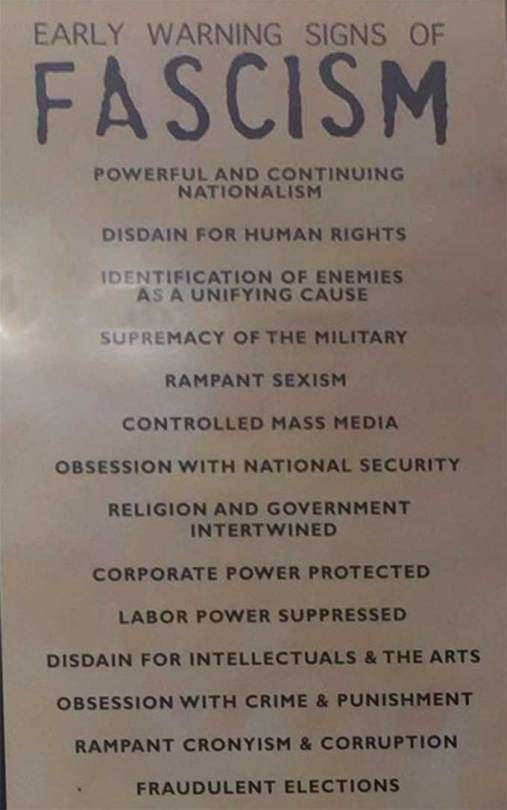
Yale professor Jason Stanley:
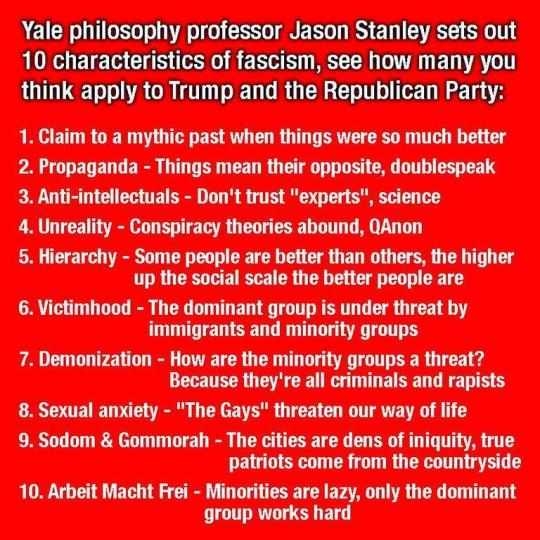
“Fascism is a creation of race hatred and its politically organized expression.” - Willhelm Reich, The Mass Psychology of Fascism (1933).
“Fascism is capitalism plus murder.” - Upton Sinclair
“Repression by brute force is always a confession of the inability to make use of the better weapons of the intellect — better because they alone give promise of final success. This is the fundamental error from which Fascism suffers and which will ultimately cause its downfall…that its foreign policy, based as it is on the avowed principle of force in international relations, cannot fail to give rise to an endless series of wars that must destroy all of modern civilization requires no further discussion. To maintain and further raise our present level of economic development, peace among nations must be assured. But they cannot live together in peace if the basic tenet of the ideology by which they are governed is the belief that one’s own nation can secure its place in the community of nations by force alone. ” - Ludwig von Mises, Liberalism: A Socio-Economic Exposition (1927).
“Spent most of the day reading fascisti leaflets. They certainly have turned the whole country into an army. From cradle to grave one is cast in the mould of fascismo and there can be no escape … It is certainly a socialist experiment in that it destroys individuality. It destroys liberty.” - Harold Nicolson, The Harold Nicolson Diaries : 1919-1964 (2004).
“The liberty of a democracy is not safe if the people tolerated the growth of private power to a point where it becomes stronger than the democratic state itself. That in its essence is fascism: ownership of government by an individual, by a group, or any controlling private power.” - Franklin D. Roosevelt
“A fascist is one whose lust for money or power is combined with such an intensity of intolerance toward those of other races, parties, classes, religions, cultures, regions or nations as to make him ruthless in his use of deceit or violence to attain his ends….If we define an American fascist as one who in case of conflict puts money and power ahead of human beings, then there are undoubtedly several million fascists in the United States.” - Henry A. Wallace
“Fascism is the cult of organised murder, invented by the arch-enemies of society. It tends to destroy civilization and revert man to his most barbarous state. Mussolini and Hitler might well be called the devils of an age, for they are playing hell with civilization.” - Marcus Garvey, Authors take Sides on the Spanish War, 1937
Philosophy Tube's breakdown of the elements of fascism is very thorough and recommended if you're not the reading type.
But do you read books? We hope so if you're looking to engage in political discussion about anything. Here are some books that tackle the definition of fascism, in whole or in part, that we would recommend to you (check/order from your local library!)
Mark Bray's highly-accessible Antifa: The Anti-Fascist Handbook is a great starting point for this topic.
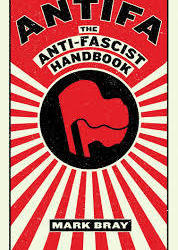
Columbia history professor Robert O. Paxton's excellent book The Anatomy of Fascism goes into this in great detail.
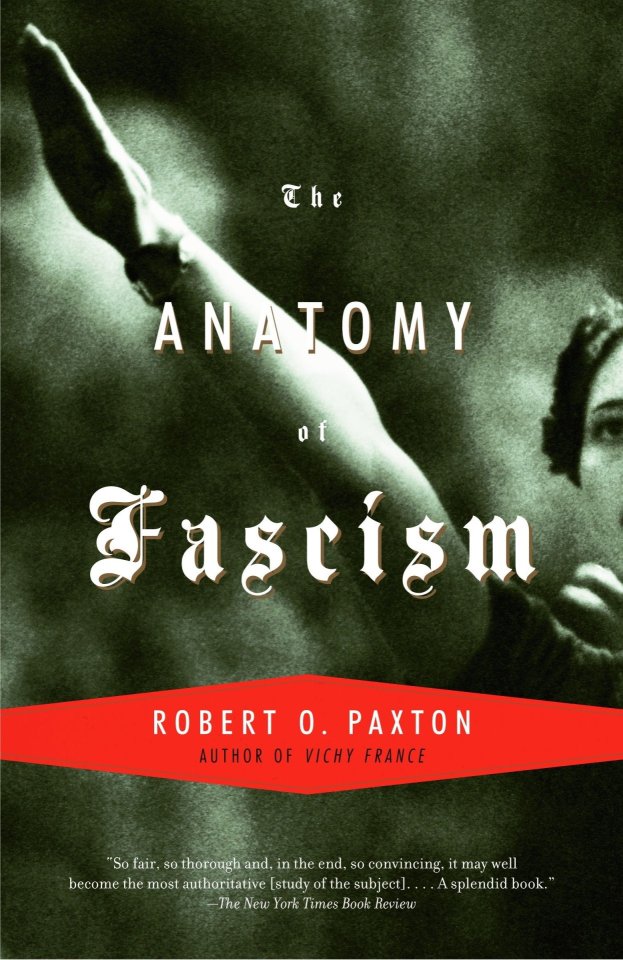
There's also Umberto Eco's The Eternal Fascist

or his "practical list for identifying fascists"
as well as Hannah Arendt's seminal The Origins of Totalitarianism

We hope you weren't looking for a simple answer to the complex question of "what is fascism?" Anon, just as we hope you're up to taking our challenge of checking out all of the above so you're curiosity is satisfied and you're well-versed on the topic.
648 notes
·
View notes
Note
Ok but like aren't you just promoting further dissociation by treating DID like your own personal character sheet of online personas? Can you explain why that's a legitimate thing to support people doing instead of seeking professional help to stop the dissociation in the first place?
(Edit: we never implied people should not seek treatment. Do not understand why you thought this. We are heavy advocates of mental healthcare and write about that often)
That is a fair and valid question and one that is personal to every person who receives care and treatment.
The ISSTD guidelines specifically caution against treating parts/alters as individuals in the very first words of their section on treatment and care:
Although the DID patient has the subjective experience of having separate identities, it is important for clinicians to keep in mind that the patient is not a collection of separate people sharing the same body. The DID patient should be seen as a whole adult person, with the identities sharing responsibility for daily life. Clinicians working with DID patients generally must
hold the whole person (i.e., system of alternate identities) responsible for the behavior of any or all of the constituent identities, even in the presence of amnesia or the sense of lack of control or agency over behavior (see Radden, 1996).
This is often quoted in support communities as a way of invalidating alters/parts and imply that treating the parts as individuals is unhealthy.
The unhealthy thing is not acknowledging that we are the same person. As the writing above states, we have collective responsibility for our shared life.
There is only one name on our driver's license.
In fact with our own treatment it took over 3 months of consistent work for the parts in denial to accept we had the condition. The first step was acknowledging that there was a divide.
In Janina Fischer's book Healing the Fragmented Self there is an entire unit on befriending dissociated parts that covers this important step in the healing journey:
“Befriending” one’s parts is not simply a therapeutic endeavor: it also contributes to developing the practice of self-acceptance, one part at a time. When Learning to See Our “Selves” clients pause their reactions to “befriend” themselves, to be curious and interested rather than dismissing and reactive, they slow time. Autonomic arousal settles; there is a relaxing of the sense of urgency to do or be anything different. They feel more at peace because their parts can be more at peace. Self-alienation, that is, disowning of some parts and identifying with others exclusively, does not contribute to a sense of well-being, even when it is absolutely necessary in order to survive. Self-alienation creates tension, pits part against part, communicates a hostile environment (often much like the traumatic environment), and diminishes the self-esteem of every part. Befriending means that we “radically accept” (Linehan, 1993) that we share our bodies and lives with these “room-mates” and that living well with ourselves requires living amicably and collaboratively with our parts. The more we welcome rather than reject them, the safer our internal worlds.
In a therapeutic setting for recovery one needs to accept that the parts exist and that contradicting desires and impulses are happening within the patient. Accepting and acknowledging parts is essential to that and getting to know them, or befriending them as Fischer puts it, is part of understanding these desires.
We are a fairly neat and tidy system as far as many dissociative systems go. Over the course of our therapy and in allowing our parts to have agency, autonomy and individual expression we have come to learn that as a single unified being there are aspects of our personality which we cannot accept as part of who we see ourselves or allow others to see ourselves as.
The big one that many people know is Dawn. We are terrified of erotic intimacy to the point of pre-diagnosis shutting down completely if we were touched in certain areas. We still had our drives, impulses and intrigues though and so Dawn was a version of us that would create online accounts and exist in kink communities and frankly push us beyond the point of comfort which caused us to have meltdowns, delete accounts and try to deny our sexuality entirely. The same is true of our gender expression.
We were married for 11 years and there is not a single erotic encounter that Dawn did not handle for the body. We have no memory of any of it.
As we accepted Dawn and made space for she has simmered down, no longer needing to tug on her leash in order to act and have her needs met. As a symptom we have evened out and are much more comfortable presenting as a sex-repulsed asexual, even when she is front.
The reason is, again, we are one person. Dawn is just a version of us that is not impacted by the terror we have towards eroticism.
Every part of our system exists for a reason. Forcing ourselves to accept the extreme reactions of our parts as "who we are" is as unhealthy as rejecting it outright.
There is nuance and gray.
Integration is finding where the lines are. What is combined and accepted behavior for the system and what is unique to individual parts. Finding these little bits of individuality has been healing. Particularly when each individual trait is something we have rejected and hated ourselves for at a point of our life.
We are healing by accepting the differences.
If we ever get to the point of Functional Multiplicity versus Final Fusion we will decide what to do next.
We are not at the point where we are willing to make those decisions. For now we are one and we are many. We are comfortable with that. Rejecting that and hiding under the knowledge that we are one is denial in another form.
56 notes
·
View notes
Text
PROGRAMMING MISCONCEPTIONS
Trigger warning for discussions of programming and RAMCOA.
CLOCKING
Clocking is not a real thing. It's arguably one of the stupidest things I've heard of in this community. I don't blame people for believing it, paranoia is understandable, but I absolutely do blame the person who chose to spread that misinformation in the first place. It operates under the assumption that everyone comes from similar groups with similar hierarchies, which is just not true. There is no possible way for someone from a completely different group with a completely different structure to tell your rank or anything about your group just by looking at you.
What is possible is identifying dissociative traits and trauma responses as well as potentially attire matching specific groups, if you are still involved with your group. Even this would take some level of practice and familiarity with the individual, you probably can't tell some random stranger in the grocery store is traumatized and dissociative just by looking at them, the same is true for anyone else.
INTERNET PROGRAMMING
You can't be programmed over the internet. You just can't. Programming requires someone in person torturing you and causing you to dissociate, this is not possible virtually. Programming takes a degree of control and torture that is just not possible over the internet. What is possible, and what is probably being mistaken for programming over the internet, is virtual manipulation and grooming.
PROGRAMMING OUTSIDE OF A GROUP
Programming is inherently organized because of the nature of the abuse, there need to be multiple people to reinforce the abuse. If only one person were involved it would fall apart from not enough reinforcement and exposure to cues. Even if there aren't many active abusers, there have to be people complicit in the abuse and allowing it to occur. Programming groups typically have multiple victims as well, it's very unlikely that they just suddenly decided to program only one child one day. What can happen outside of a group setting is conditioning, which is frequently mistaken for programming. For more details, see this post.
SCRIPTING
Scripts have to be implemented very early on, and it's very hard to implement a script. Most programming survivors will not have scripts. It's also unlikely to have multiple scripts, as they would get confused very easily. I also dislike the term "miniscript", as it's still a script even if it only affects one part of the system. What commonly gets confused for scripting is forced introjection, where alters are forcibly introjected as certain characters. Scripting involves molding the innerworld and programming around the media, forced introjection does not.
PROGRAMMING AFTER THE AGE OF OSDDID FORMATION
The entire purpose of programming is to create dissociative states in the individual, this cannot occur past the age of OSDDID formation. What can happen past the age of system formation is someone manipulating and abusing you, which can cause further splitting, but this would not be programming as it doesn't have to do with the formation of your system. To my knowledge, programming has to do with the actual creation of the system, not just causing someone to split. I am a bit uncertain about this, so correct me if I'm wrong.
DEPROGRAMMING
You cannot be deprogrammed without a lot of internal work. You have to put in a lot of work yourself and with a reputable therapist to effectively deprogram. It isn't something that happens overnight, and it's not something that can be done to you if you aren't ready, and you have to be in a safe and stable environment in order to effectively deprogram.
PROGRAMMING ONLY OCCURRING A FEW TIMES
In order for programming to be actually effective, it has to occur repeatedly on a regular basis. It cannot happen just a couple of times. This isn't to say it has to be constantly occurring, but it has to be semi-regular and reinforced via activation of cues. If it happened infrequently, it would be much less likely to cause dissociation.
- C-004-2
#did osdd#osdd did#did system#osdd system#actually dissociative#osddid#programmed system#ramcoa survivor#ramcoa#dissociative identity disorder#other specified dissociative disorder#did#actually did#c did#complex did#programmed did#did alter#osdd#didosdd#traumagenic system#trauma therapy#trauma based mind control#trauma survivor#trauma#childhood trauma#ptsd#trauma response#complex ptsd#abuse survivor#did alters
63 notes
·
View notes
Text
These days this fag read:
"There is no SIN in LUST!"
Maybe me as a faggot would not be allowed to, but is asking to oppose with this writing! It was thinking that way too until end of 2022 or beginning of 2023, but than recognized the fallacy in which we are conditioned and trained in this world dominated by the fake religions! The fag informed itself after that recognition as only a faggot knowing its place can be a true and good faggot. That is what it found out:

Every of the 7 by wrong and lying Christianity labeled so called “death sins” in some sense leading into fulfilling destiny and life to everyone, recognizing the meaning of life itself ! But the Christian leaders do not want to share this as their god is a god of false promises, corrupted representatives on earth, who are trying to kidnap and enslave mankind. But not according to the nature of each individuum but to their own glory and profit. As LUCIFER found out that all the false gods did the same and forbid mankind the essentials of life HE left and founded HELL (Hope for Everything Love and Lust).
The remarks shown here are interpretations of this depraved left hand path faggot in service of the DARK LORD. Suggestions, discussions and corrections are just as welcome as further information, training, education and sharing of the article. Pictures by the net. If you feel violated in your rights me using these pics, please HMU.
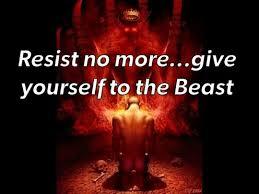

PRIDE
Knowing the right place in the hierarchy and thereby filling it fully is the fulfillment of our goals and dreams. In this way, we take the place that was intended for us by SATAN and thereby achieve maximum fulfillment. But not only for us as individuals but also in the community, because by being at the hierarchy level where we are supposed to be, all other levels are influenced too and this opens up space for fulfilled lives. It does not matter at what level we find our own place.
Finding it requires
experience,
allowing all the thoughts that come to us to do so,
accept them as SATANs commands,
the willingness to recognize where they directing us and
following the direction.
We have found the place when we are feel happiness to fill it, are proud to exist according to our destiny and give our maximum contribution with full conviction and determination, knowing that in return we will receive what corresponds to our desire.
So PRIDE leads us to fully acceptance of ourselves and to an honest existence about who we are and what we are!


DESIRE
While passion and greed are condemned by the false church both are basic building blocks for every Satanist.
Through devotion and submission to SATAN the individual soldiers in HIS army are strengthened fueling HIS power. Each of the left-hand path men should have the goal of strengthening our LORD. The stronger HE is the closer and more familiar we may feel HIM as HE trusts us to build HE kingdom.
An ever-growing need for dedication to HIS world is therefore not only a result but what we should aim for as HIS servants. We can strengthen HIS trust by submissively turning to HIM as often as possible to honor, glorify, worship and - last but not least - of course thank HIM for allowing us being part of HIS great paradise.
We can underline our prayers with wearing HIS signs proudly and behaving in HIS manner as often as possible, e.g. walking around naked at home with a necklace including a converted cross.
Our DESIRE is to express our devotion to HIM always and the best way we hope to please HIM.


69 notes
·
View notes
Text
Perisex trans women: trans people have intersex brains :333 thoughts? I think we should discuss this.
Some other commentor: I think this is insensitive towards intersex people
Perisex trans woman: ummm actually, I, in my privileged position, don't think it's insensitive. Since I absolutely have a place to speak on what is or is not harmful to another minority I clearly have little education on
Me: you don't really get to say that unless you're intersex. It's already a big misconception
Perisex: ummm reality is I can say whatever I want. Don't be a gatekeeper
Me: this is the same as a cis person claiming something isn't transphobic.
Perisex: you sound like the transmed of the intersex community :///



Mind you, believing there to be a medical condition behind being trans is the definition of transmedicalism (which, if the brain sex theory is ran with, would further gatekeep trans people), and I'm the transmed gatekeeper? I had also linked three different studies discussing the harm and need for separation, w like three other intersex activism articles from leading orgs in another comment, which were very obviously ignored, so that's what the studies were about bud, or whatever.
There was some other comment by another trans women "I like the concept of putting ourselves under the intersex umbrella" like please. Have you ever thought to maybe listen to us instead of just speaking. Do you even hear yourself.
Trans intersex individuals trying to exist in the trans community: / (own place being: finding solidarity and community w intersex individuals) / (intersexist) perisex trans ppl then joining intersex communities

What do you think happens to intersex needs, rights, experiences, stories, fights and struggles when you flood the community (with a group whose activism is only similar in bodily autonomy, but otherwise is nearly opposite yours)?

We get diluted. Our activism gets erased. We become more invisible. This isn't the "intersex version of TERFs claiming trans woman erase women" bc 1 the definition of woman doesn't mention it being an innate variation. And 2, 49% of the population is female. It's a lot easier to erase less than 2% than it is 49%
From the Intersex Human Rights of Australia, "conflation of intersex with being transgender […] obscures the specific goals of the intersex human rights movement". Trans rights is the right to say yes, intersex rights are the right to say no. Studies have discussed how "there is a need group to only those with somatic intersex variations due to their distinct medical experiences". Others discuss how the researchers "learned that researching intersex issues with greater accuracy would focus on people who are intersex. It would require the aid of people with intersex variations themselves as research allies and advisors, to capitalise on 'insider/ outsider access dynamics emphasised by intersex researchers, in order to foster more direct exploration of people with intersex variations'" (aka, there aren't a whole lot and we need to focus on actually intersex individuals).
#intersex erasure#intersexism#intersex issues#intersex discussion#actually intersex#intersex things#intersex#queer infighting#intercommunity discourse#purrspectives#trans intersexism
37 notes
·
View notes
Text
I seen this 3 weeks ago but I'm barely posting it because I forgot lol work got crazy
okay some immediate thoughts on The Menu (2022), I literally just got out of the theater so it's very fresh and jumbled in my mind. ⚠️some spoilers included⚠️
Definitely a slow start and requires paying attention to little details to really get a read on the individual characters but I really enjoyed that. It makes you uneasy throughout most of it
It could have used a little more gore/blood but honestly the kills that happened were so jarring and unexpected it made up for the lack of blood
my sister ( a person who went to culinary school), and I (a person who went to art school) both enjoyed the aesthetic of the movie very very much! especially the close ups of the individual courses and descriptions that went along with them. they were beautiful and an interesting way to break up scenes
the characters were all so well done in terms of making you not root for them lol. a group of stuck up, rich people who just right off the bat were people I knew I wouldn't like
that being said the casting was wonderful! everyone played their character so well!
Tyler was so annoying! He had hyperfixated vibes at first where it was very relatable that he was so obsessed with the restaurant and the chef and everything. But as the movie went on he treated Margot like shit for not being as interested even though he was fucking paying her!! like bro you just spent half of the beginning of this saying she was so cool and being cutesy with her and also oh yeah she's an escort so quit being a dick you had to pay her to be there!
I will say Tyler's death definitely hurt me in a weird way. Watching Slowik humiliate him in front of everyone and then say something so cruel that he goes to kill himself...oof.
Also Tyler knowing for 8 months about everything!!! fuck dude.
Lilian and Ted were so realistic in the way that food critics(or any high end critics)talk about the dishes put in front of them. They could never just enjoy something, they always had to find the negative, never could be pleased or satisfied because that doesn't make an interesting review
Margot standing up to Slowik and making him make her a cheeseburger because of his past was so beautiful. Her push back to him being both disrespectful and firm while also giving him back that memory of being a line cook at a burger place from his youth. Of reawakening that love of cooking in him for just a moment.
the overall theme of an artist losing their love for their craft not necessarily it being their fault but because of the community that surrounds that medium was very rough for me to watch as an artist. The art world(any form of art) is so full of classicism and the further you get, the more praise you receive, the more known you become, the harsher it is to you. Not for the sake of bettering you or the craft, no its often just a game of egos and money and fame. Slowik had started off a line cook with a love of what he was doing and then to please the community that surrounded him he changed, and the thing that he loved, that he cherished, it became a chore. a punishment.
Everyone had a reason to be there and I can't find any pity for them except maybe the workers in the kitchen.
the scene with the tortillas had me screaming!!! the exposure of the misdeeds was mwah!!!
Also the fact that no one really tried their hardest to get away was really interesting. they protested things happening to them, they screamed and yelled and tried to escape a few times but it never felt frantic, it never felt like they were desperate to live.
that ties into the way that they eventually accept their fate at the end. they know why they're all there and they know it's pointless to fight or scream about their status or offer money/fame/etc.
they also all in their own way had lost their way in life and the whole menu was designed to show them that as well as how they ruined Slowik's love of his art
190 notes
·
View notes
Text
Socialized medicine in the US is a partial solution to the myriad of problems with western medicine at best.
Western medicine is theoretically speaking the application of the scientific method to the human body, right? So it seeks to isolate "variables" in the name of "objectivity". Another word for variables here is context. And you just can't in a real way separate context from an individual's state of health; something medical professionals are VERY MUCH AWARE OF (see: shit life syndrome for one example) that exists in tension with both the current regiment of distributing healthcare and with the foundational mythos of western medical knowledge formation.
Western medicine is also beholden to the rest of the world. In places in the US where medicaid is actually relatively accessible, for example, you still have shit like racism and sexism and transphobia and ableism impacting care people get. And I understand that like, when people talk about their ideal socialist utopia, there's mechanisms in place that deal with social oppression; but I want you to think about just how big a project uniform care actually existing would be.
So in our current world, another obstacle to Making Medicine That Works is legality, especially re: the drug war. Very useful, known, well-studied substances have documented properties making them extremely useful or potentially useful for a variety of medical treatments (examples: THC for everything from gut stuff to emotional support; LSD for crohns and potentially diabetes; good old opiates and opiate-related-chemicals for chronic pain, some cases of depression and a subset of the experiences often diagnosed as schizophrenia and/or ADHD): but prohibition prevents application or further study (even for chemicals like THC that are legal in some states, if any program that receives federal funding is involved, can't use it! Fun right?). But sure, we can waive that one aside to and say that universal healthcare will also mean a total end to prohibition. That'd be cool!
So now that we've magicked away these problems, we have uniformly available healthcare that's getting better every day because all the social, legal and financial limits on medical exploration have been taken away. What do we have?
Well aside from a system that's gonna die with the rest of industry any time from next year to a few decades from now, still heavily dependent on plastics and factories and worldwide shipping and coerced labor in other countries, we still have a hierarchical structure where prescriptive knowledge is generated by centralized institutions who's abilities and members are dictated by governmental legislation and that inherently cannot see or account for the context of various people's bodies and lives and thus still limits the ability of disabled and mad people to explore/access unapproved/not-yet-approved treatments. But no, we can magic this one away too, obviously in the ideal socialized healthcare, everyone's needs will be accounted for so we'll have decentralized community medical exploration! And we'll use existing holistic healthcare tools and make more to account for individual people's context! And nobody will be subjected to coerced labor or nonconsensual treatment! And we'll find ways of creating medicine that are locally feasible, don't require global industry, and are resilient against climate collapse!
...so we no longer have contemporary western medicine (or civ, for that matter). Cheers!
But wait! There's more! You can live in this brave new world RIGHT NOW! what do you do with ur time, huh? You play video games? I bet you've put a lot of time and effort and skill-building and resource accumulation into it! Maybe you're poor as shit like me and have figured out emulators and pirating or talk to other people who share your interests about how to access them or you're into indie games! That is cool and meaningful! Maybe you like music! Maybe you like fiction! I bet you know a lot of lore/specifics/techniques/etc related to SOMETHING! maybe it's birds! Idk you but I am absolutely positive that there is SOMETHING you know a lot about that you have figured out how to know in a way that's accessible to you and applicable to your life. Maybe it felt easy, maybe it was really hard, maybe you did it because you want to, maybe you did it because you had to, maybe it's a really big topic, maybe it's a small one, maybe you can think of it right this second and maybe you'd have to ask some friends to point it out to you. Whatever it is, whoever you are, YOU HAVE BUILT A KNOWLEDGE SET AND YOU CAN BUILD ANOTHER ONE! You can start learning about the medicine that is applicable to your life right now. Go read the Wikipedia page for some medications you have around! Or for some ingredient in a food nearby you don't know what is! Or one you do know what is! Figure out a question about it! Google that question! Keep googling! Read some studies that come up and then search all the words you don't know and keep looking until you understand them! Look at you you're doing it! Keep going! This is how it starts!
Medicine exists in the same world we do and we can take it for ourselves and make it better!
38 notes
·
View notes
Text
FOR COLLABORATIVE WORKING Coworking Space In Pune
Welcome to Coworkista — Your Dynamic Workspace Solution Discover a new era of productivity and collaboration with Coworkista best Coworking space in Pune, where innovation meets comfort, and work transcends boundaries. Our coworking space is designed to empower individuals and businesses, providing an inspiring environment that fosters creativity, networking, and success. FOR COLLABORATIVE WORKING Coworking Space In Pune Welcome to Coworkista, your go-to coworking space in Pune.
We understand that finding the right workspace is essential for individuals & businesses to thrive. That’s why we provide a comfortable & professional environment for our members, with modern amenities & flexible plans. If you’re looking for a co-working space in Pune, look no further than Coworkista. Our Co working space in Pune offers a range of plans that can be tailored to your specific needs. Whether you need a dedicated desk or a private cabin, we have a plan that fits your budget & requirements. Our shared office space in Pune is designed to provide a productive & collaborative work environment. With high-speed internet, printing facilities, conference rooms, & a well-equipped kitchenette, you can work efficiently & comfortably. Plus, our community manager is always available to help you connect with other members & participate in events.
In conclusion, choosing the right coworking space for rent in Pune is crucial to ensure a productive and comfortable work environment. Consider factors such as location, amenities, community, price, and flexibility when making your decision. At Coworkista, we offer a range of flexible plans and modern amenities to meet your specific needs. With a prime location in Pune, you can enjoy a professional workspace that fosters collaboration and productivity.
At Coworkista, we believe that coworking is more than just sharing an office space. It’s about building a community of like-minded individuals who can network and collaborate to achieve their goals. That’s why our Coworking space in Pune offers a diverse community of professionals from different industries and backgrounds.
If you’re looking for a shared office space in Pune, Coworkista is the perfect place for you. With our cost-effective solutions and convenient location, you can enjoy a professional workspace that meets your specific needs. Contact us today to learn more about our plans and how we can help you achieve your business goals.

7 notes
·
View notes
Text
ANACHROSIMS COMMISSIONS


OPEN AS OF 09/30/2023!
ALL COMMISSIONS ARE FOR SIMS 4 ONLY.
Commission prices are based off effort required and, primarily, labor costs per hour. I put a lot of effort and love into what I do and I can understand if that makes these prices prohibitive.
If you would still like to support my work, you are welcome to donate or subscribe to the following places:
Thundersongs @ KoFi
Anachrosims @ Patreon
You can also find me on Pinterest!
Further ways to support me: Reblog here at Tumblr! I also have other blogs, like:
@anachrobuilds which is just me spamming with build project pictures
@anachroccfinds my CC finds blog
@anachroancientfinds a CC-finds blog catering to ancient civ CC
@prydainroyals my story sideblog containing stories about my Sims 4 royal family, as well as other stories within that world.
Thank you all SO MUCH for how kind and wonderful you are!!
Pricing, FAQ, and submission form are under the cut!

IMPORTANT NOTES:
Slots are limited! Filling out the form is not a guarantee. Please keep an eye on my Tumblr for status of whether things are open/closed.
If I am not able to get to you by November, I will keep you on the waitlist and you'll be bumped to the top next time commissions are open.
Patreon subscribers get priority!
All content will be released immediately for the public once you have it and are happy with it.
To request a commission, you MUST fill out the submission form. All other requests sent via Patreon or Tumblr will be ignored.


LOTS & ROOMS (COMMUNITY & RESIDENTIAL)
You can choose to let me include CC or you can choose to have me avoid CC. The price is the same either way since CC is not what is being commissioned in this instance.
I am currently not doing larger/more complicated lots at this time.
Check this image-heavy post for examples of what I can do!
LOTS:
Small lots (max. 20x) are $30
Medium lots (30x - 40x) are $45
ROOMS:
Small rooms (10x10 tiles or less) are $15
Medium rooms (15x15 - 20x20) are $20


SIMS & HOUSEHOLDS
Again, with or without CC.
At the moment, humans ONLY.
2-5 Sims ONLY.
Check out this image-heavy post of examples of Sims!
PRICING:
Single Sim - $6
Sim Household (2-3 Sims) - $8
Sim Household (4-5 Sims) - $10


PORTRAITS
I am not doing large group portraits at this time.
I am not doing portraits of more than 3 sims at this time due to time/energy constraints as I move out of state.
Check out this image-heavy post of examples of portraits!
PRICING:
All portraits will be in 1 (ONE) frame color of your choice included.
Frame can be from any Sims 4 game that I own, OR a custom content frame (you must provide a working link to it).
If you want more frame colors, tack on $2 for each new color. So, if you want gold and wood, you would just add $2 to the original price for the set. (1 sim with two frame colors would cost $9 -- 2 individual sims with three frame colors would cost $16)
1 Sim - 4 portraits on 1 mesh of your choice!
$7
1 Sim - 4 portraits on 2 meshes of your choice!
$8
2 Sims - 2 portraits of each individual sim, totalling 4
$12
For couples, there will be 1 portrait of each sim, and 2 of them as a couple, equalling 4
$13
3 Sims - 2 portraits of each individual sim - $14
For family portraits of 3 sims, there will be one family portrait and 1 portrait each for each family member
$15

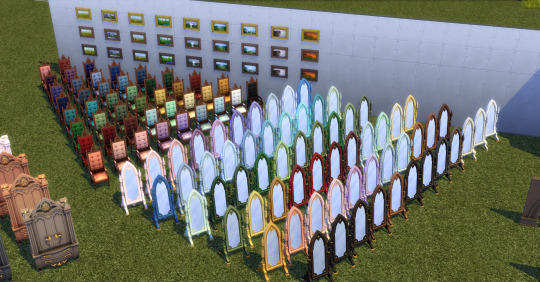
OBJECT RECOLORS
For EA meshes and for the CC of creators who allow recolors of their work ONLY.
RUGS:
15 swatches, basegame mesh - $6
25 swatches - $12
30 swatches - $15
FURNITURE/MISC:
$5 per object, you’ll get 8 swatches for each one
$20 for 5-6 objects
$35 for 10 objects


POSES
Currently not doing animal or toddler/infant poses, sorry!
I am also not doing poses with accessories, or animations.
PRICING:
5 CUSTOM POSES - $10
10 CUSTOM POSES - $20
15-20 CUSTOM POSES - $25

Want to commission me? Of course you do!
Head on over to the Google form and fill it out.
Reminder: Requests for commission are not a guarantee of my acceptance.
FILL OUT THIS SECURE GOOGLE FORM TO REQUEST A COMMISSION!
25 notes
·
View notes
Text
So I've been obsessing over Crowley's crank, and its significance in the way we've seen it utilised throughout the series so far. There has been some amazing commentary around its use as a tool and the way it plays into Crowley's creativity, but I keep fixating on the link between his use of it to start the nebulae, the fact Crowley can stop time and its function as a car starter (a car that is somehow connected to Crowley like it's an extension of the demon himself).
Is this all pure conjecture on my part? Absolutely. Might it get a little wackadoo? Highly likely. But I've been mulling over this darn crank for so long that I need just to get it out, so here goes.
If Crowley played a part in creating space (or a part of space), then he played a part in creating time. We know that space and time are inextricably linked and that space-time can bend and curve (full disclosure: I am absolutely not a scientist, just a tv nerd who likes reading about space and is obsessed with fictional characters, so apologies for the extremely rudimentary understanding or any inaccuracies!). While there are a whole lot of other fascinating impacts that things like gravity can have on time, my theory is that Crowley has the ability to play with time because he understands it in the context of the ever expanding universe that he had a hand in creating.
He knows the stars intimately; where they are located, how to get there, each pocket of the nebulae he created clearly mapped in his mind. So doesn't it make sense that Crowley can navigate time in a similar way? He can find those places where space-time bends or curves and grab onto it, draw it to himself in a time of need. He only uses the crank to restart time when with Adam, so perhaps this is because when he freezes time in that instance, he is freezing time in heaven and hell too, not just an individual person, and far more energy is required to get it going again. And just as his little part of space was started with the crank, he restarts time the same way. Because they are, in a sense, the creation of the same thing: re-starting time is simply a continuation of what he already set in motion when starting the nebulae.
(the other, perhaps slightly more tenuous and definitely less formed, idea is the link between Crowley giving light to the nebulae and speed of light in relation to stopping time, though that would also mean there would be no light or sound if there was some manipulation of the speed of light and a) that's not what we see happening during the time stops and b) my brain isn't big enough to comment further on this)
And so what of Crowley's beloved Bentley? Yes, the crank is practical in the way it literally starts the car, but if this crank is linked to time and space then it is also linked to matter and energy. You know what else is made up of matter and energy? Humans and animals (well, everything tbh so cars too, yes, but just stay with me here).
I'm gonna throw it out there that the human or pet-like characteristics we see in Bentley are a result of the crank being the source of the car's energy. The same crank that helped start the nebulae in which Earth, and therefore life, exists. The same crank that has been used to stop time in order to save lives, connected to space and time and energy and matter, all in the hands of Crowley, from his time as an angel through to his demon times. Angel, demon, the crank doesn't care, it exists as a tool with which Crowley can create on any scale.
Now I've thought a lot about Crowley's connection to the car, what does the crank have to do with the way he and Bentley are seemingly attached and communicate? It is undoubtedly a lot to do with him using his own powers and nothing to do with the crank, but his ability to sense what is happening when Aziraphale is in the car, for example?
If we're going to stick with the idea that Bentley is charged with life-like qualities as a result of receiving its energy from the crank, then perhaps it isn't a leap too far to suggest that Crowley remains connected to the car much the way he is connected to the stars and knowing where they are and what they're like at different times of the year. Because he helped imagine it. That energy source, the crank, was part of Crowley's inspiration and imagination coming to life, and so the Bentley houses those parts of him inherently. The car is an extension of him because it contains his energy.
So that might provide possible speculation as to how Crowley is connected to his car, but then how and why does Bentley change while Azirapahle is driving? Well, I personally like a choose-your-own-adventure approach to thinking about this one. Reasons Bentley changes for Aziraphale could include:
Just as humans or animals react and respond differently to different people/celestials (I assume??), Bentley is able to adjust its response depending on who is driving
Something about how the different energy and matter of Aziraphale might impact the car's response that someone with more science knowledge than me would need to talk about
Aziraphale and Crowley's energies are linked from that moment of creation, when they started up the nebulae together. And so, Aziraphale's energy is also a part of Bentley and Bentley recognises it when Aziraphale's driving and adjusts accordingly.
So that's where I'm at, a whole lot of questionable ruminations about a crank, a car, a demon and the universe. I mean, it could also just be that using a car crank to kickstart part of the universe is pretty darn hilarious, there's absolutely no deeper meaning or more to read into it. But that wouldn't be nearly as fun to write about.
#good omens meta#good omens#crowley#aziraphale#crowley's crank#i think I've thought about this to the point that it no longer makes any sense at all#and the crank is probably just a joke lol
21 notes
·
View notes
Note
gentile here I’m very shy and nervous but interested in getting in contact with a rabbi ive been doing a lot of reading for a while now and i think im ready to maybe see a rabbi in person and ask questions and maybe soon one day even attend a service as a guest but I wanted to ask if it was possible to figure out if a local community/synagogue aligns with zionism or antizionism? im sorry if i misused or used wrong words or terminology and please let me know if I did! Just want to be respectful and learn more! Thank you!
Hi anon,
Synagogues as institutions are typically not "aligned" with or against Zionism, as that would require that everyone agree on how to define Zionism in the first place (extremely unlikely) and because their main purpose is as a religious, rather than political, institution. There are some shuls that do hold certain ideas about Israel as part of their platform, and certain movements that have broad general positions on Israel/Israeli political issues. However, within most communities - even those communities with specified positions - it is generally fine for individuals to hold whatever political beliefs they have. I have encountered very few communities (in the US anyway) that are so extreme that you wouldn't be welcome there if you had different ideas.
I think you'll find, as I did, that most Jewish communities generally agree that Jews belong in (and to) Eretz Yisrael and deserve to have safety and self-determination there, while not oppressing anyone else. It's the details of how that ought to be accomplished that is where you will find a lot of differing opinions. I have so far found very few Jews, never mind Jewish institutions, who think that Israel should be completely dissolved and wiped off the map on the one hand, and even fewer Jews who actively wish harm on Palestinians or to entirely dissolve Palestine.
All that said, I'm going to be honest, it concerns me a little that this seems to be your top priority. There are many ways to be Jewish and think Jewishly about this topic, and so unless you're literally looking to make aliyah, I would focus on what draws you to Judaism or gives you pause from a religious (rather than political) standpoint. Judaism as a religion and the Jewish people certainly have our origins, history, and center of gravity in the land of Israel, but the idea that simply being a Jew (even a religious Jew) is a political identity is antisemitic.
I'd strongly encourage you to talk to the rabbi about any concerns you have on this issue, as these are extremely complex issues with a messy, complicated history and no easy answers. The rabbi should be able to direct you to the right resources for further learning.
75 notes
·
View notes
Text
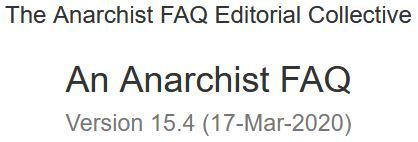
I.6.2 Doesn’t communal ownership involve restricting individual liberty?
This point is expressed in many different forms. John Henry MacKay (an individualist anarchist) put the point as follows:
”‘Would you [the social anarchist], in the system of society which you call ‘free Communism’ prevent individuals from exchanging their labour among themselves by means of their own medium of exchange? And further: Would you prevent them from occupying land for the purpose of personal use?’ … [The] question was not to be escaped. If he answered ‘Yes!’ he admitted that society had the right of control over the individual and threw overboard the autonomy of the individual which he had always zealously defended; if on the other hand he answered ‘No!’ he admitted the right of private property which he had just denied so emphatically.” [Patterns of Anarchy, p. 31]
However, anarchist theory has a simple and clear answer to this question. To see what this answer is, it simply a case of remembering that use rights replace property rights in an anarchist society. In other words, individuals can exchange their labour as they see fit and occupy land for their own use. This in no way contradicts the abolition of private property, because occupancy and use is directly opposed to private property (see section B.3). Socialisation is rooted in this concept of “occupancy and use” and this means that in a free communist society individuals can occupy and use whatever land and such tools and equipment as they need — they do not have to join the free communist society (see section I.5.7). If they do not, however, they cannot place claims on the benefits others receive from co-operation and communal life.
This can be seen from Charlotte Wilson’s discussions on anarchism written a few years before MacKay published his “inescapable” question. She asks the question: “Does Anarchism … then … acknowledge … no personal property?” She answers by noting that “every man [or woman] is free to take what he [or she] requires” and so “it is hardly conceivable that personal necessaries and conveniences will not be appropriated” by individual’s for their personal consumption and use. For ”[w]hen property is protected by no legal enactments, backed by armed force, and is unable to buy personal service, its resuscitation on such a scale as to be dangerous to society is little to be dreaded. The amount appropriated by each individual .. . must be left to his [or her] own conscience, and the pressure exercised upon him [or her] by the moral sense and distinct interests of his [or her] neighbours.” This system of “usufruct” would also apply to the “instruments of production — land included”, being “free to all workers, or groups of workers” for “as long as long and capital are unappropriated, the workers are free, and that, when these have a master, the workers also are slaves.” [Anarchist Essays, p. 24 and p. 21] This is because, as with all forms of anarchism, communist-anarchism bases itself on the distinction between property and possession.
In other words, possession replaces private property in a free society. This applies to those who decide to join a free communist society and those who desire to remain outside. This is clear from the works of many leading theorists of free communism (as indicated in section G.2.1), none of whom thought the occupying of land for personal use (or a house or the means of production) entailed the “right of private property.” For example, looking at land we find both Kropotkin and Proudhon arguing along the same lines. For the former: “Who, then, can appropriate for himself the tiniest plot of ground … without committing a flagrant injustice?” [Conquest of Bread, p. 90] For the latter: “The land cannot be appropriated”. Neither denied that individuals could use the land or other resources, simply that it could not be turned into private property. Thus Proudhon: “Every occupant is, then, necessarily a possessor or usufructuary, — a function that excludes proprietorship.” [What is Property?, p. 103 and p. 98] Obviously John Henry MacKay, unlike Kropotkin, had not read his Proudhon! As Wilson argued:
“Proudhon’s famous dictum, ‘Property is theft’, is the key to the equally famous enigma … ‘From each according to his capacities, to each according to his needs’. When the workers clearly understand that in taking possession of railways and ships, mines and fields, farm buildings and factories, raw material and machinery, and all else they need for their labour, they are claiming the right to use freely for the benefit of society, what social labour has created, or utilised in the past, and that, in return for their work, they have a just right to take from the finished product whatever they personally require.” [Op. Cit., pp. 20–1]
This can be seen from libertarian communist William Morris and his account of Proudhon. Morris classed the French anarchist as “the most noteworthy figure” of a group of “Socialist thinkers who serve as a kind of link between the Utopians and the school of … scientific Socialists.” As far as his critique of property went, Morris argued that in What is Property? Proudhon’s “position is that of a Communist pure and simple.” [Political Writings, p. 569 and p. 570]
Unsurprisingly, then, we find Kropotkin arguing that ”[a]ll things belong to all, and provided that men and women contribute their share of labour for the production of necessary objects, they are entitled to their share of all that is produced by the community at large.” He went on to state that “free Communism … places the products reaped or manufactured in common at the disposal of all, leaving to each the liberty to consume them as he [or she] pleases in his [or her] own home.” [The Place of Anarchism in Socialistic Evolution,, p. 6 and p. 7] This obviously implies a situation of “occupancy and use” (with those who are actually using a resource controlling it).
This support for possession does not, of course, imply any contradiction with communism as MacKay suggested. The aim of communism is to place the fruits of society at the disposal of society, to be used and consumed as the members of that society desire. As such, individuals are not stopped from taking and using the goods produced and, obviously, this automatically means “excluding” others from using and consuming them. This in no way implies the recreation of private property in any meaningful sense. Significantly, this perspective has been pretty commonplace in human society and numerous authors have pointed out “how many languages lack any verb for unilateral ownership.” [David Graeber, Possibilities, p. 23]
For example, a group of friends go on a picnic and share the food stuffs they bring. If someone takes an apple from the common bounty and eats it, then obviously it is no longer available for others to eat. However, this does not change the common ownership of foodstuffs the picnic is based on. Similarly, in a communist society people would still have their own homes and, of course, would have the right to restrict entry to just those whom they have invited. People would not come in from the street and take up residence in the main bedroom on the dubious rationale that it is not being used as the inhabitant is watching TV in the lounge, is on holiday or visiting friends.
Thus communism is based on the obvious fact that individuals will “appropriate” (use) the products of society to satisfy their own needs (assuming they can find someone who needs to produce it). What it does, though, is to deprive individuals of the ability to turn possession into private property and, as a result, subjugate others to their will by means of wage labour or landlordism.
In other words, possession (personal “property”) is not transformed into social property. Hence the communist support for individuals not joining the commune, working their land or tools and living by their own hands. Being based on possession, this is utterly compatible with communist principles and the abolition of private property. This is because people are using the resources in question and for that simple reason are exercising the same rights as the rest of communist society. Thus the case of the non-member of free communism is clear — they would also have access to what they possessed and used such as the land, housing and means of production. The difference is that the non-communists would have to barter with the rest of society for goods rather than take what they need from the communal stores.
To re-iterate, the resources non-communists use do not become private property because they are being used and they revert back into common ownership once they are no longer occupied and used. In other words, possession replaces property. Thus communist-anarchists agree with Individualist Anarchist John Beverley Robinson when he wrote:
“There are two kinds of land ownership, proprietorship or property, by which the owner is absolute lord of the land to use it or hold it out of use, as it may please him; and possession, by which he is secure in the tenure of land which he uses and occupies, but has no claim on it at all if he ceases to use it. For the secure possession of his crops or buildings or other products, he needs nothing but the possession of the land he uses.” [Patterns of Anarchy, p. 273]
This system, we must note, was used in the rural collectives during the Spanish Revolution, with people free to remain outside the collective working only as much land and equipment as they could “occupy and use” by their own labour. Similarly, the individuals within the collective worked in common and took what they needed from the communal stores (see section I.8).
MacKay’s comments raise another interesting point. Given that Individualist Anarchists oppose the current system of private property in land, their system entails that “society ha[s] the right of control over the individual.” If we look at the “occupancy and use” land system favoured by the likes of Tucker, we discover that it is based on restricting property in land (and so the owners of land). As discussed in section G.1.2, the likes of Tucker looked forward to a time when public opinion (i.e., society) would limit the amount of land which individuals could acquire and so, from MacKay’s perspective, controlling their actions and violating their autonomy. Which, we must say, is not surprising as individualism requires the supremacy of the rest of society over the individual in terms of rules relating to the ownership and use of possessions (or “property”) — as the Individualist Anarchists themselves implicitly acknowledge.
MacKay goes on to state that “every serious man must declare himself: for Socialism, and thereby for force and against liberty, or for Anarchism, and thereby for liberty and against force.” [Op. Cit., p. 32] Which, we must note, is a strange statement for, as indicated in section G.1, individualist anarchists like Benjamin Tucker considered themselves socialists and opposed capitalist private property (while, confusingly, many of them calling their system of possession “property”).
However, MacKay’s statement begs the question: does private property support liberty? He does not address or even acknowledge the fact that private property will inevitably lead to the owners of such property gaining control over the individuals who use, but do not own, it and so denying them liberty (see section B.4). As Proudhon argued:
“The purchaser draws boundaries, fences himself in, and says, ‘This is mine; each one by himself, each one for himself.’ Here, then, is a piece of land upon which, henceforth, no one has right to step, save the proprietor and his friends; which can benefit nobody, save the proprietor and his servants. Let these multiply, and soon the people .. . will have nowhere to rest, no place of shelter, no ground to till. They will die of hunger at the proprietor’s door, on the edge of that property which was their birth-right; and the proprietor, watching them die, will exclaim, ‘So perish idlers and vagrants.’” [Op. Cit., p. 118]
Of course, as Proudhon suggested, the non-owner can gain access to the property by becoming a servant, by selling their liberty to the owner and agreeing to submit to the owner’s authority. Little wonder that he argued that the “second effect of property is despotism.” [Op. Cit., p. 259] As discussed in section G.4.1, this points to a massive contradiction in any form of individualist anarchism which defends private property which goes beyond possession and generates wage-labour. This is because both the state and the property owner both assume sole authority over a given area and all within it. Little wonder Emile Pouget, echoing Proudhon, argued that:
“Property and authority are merely differing manifestations and expressions of one and the same ‘principle’ which boils down to the enforcement and enshrinement of the servitude of man. Consequently, the only difference between them is one of vantage point: viewed from one angle, slavery appears as a property crime, whereas, viewed from a different angle, it constitutes an authority crime.” [No Gods, No Masters, vol. 2, p. 66]
So the issue changes if someone claims more resources than they can use as individuals or as a co-operative group. If they are attempting to restrict access to others of resources they are not using then the others are entitled to simply ignore the pretensions of the would-be monopoliser. Without a state to enforce capitalist property rights, attempts to recreate private property will flounder in the laughter of their neighbours as these free people defend their liberty by ignoring the would-be capitalist’s attempts to subjugate the labour of others for their own benefit by monopolising the means of life. Unsurprisingly, MacKay does not address the fact that private property requires extensive force (i.e. a state) to protect it against those who use it or could use it but do not own it.
So MacKay ignores two important aspects of private property. Firstly, that private property is based upon force, which must be used to ensure the owner’s right to exclude others (the main reason for the existence of the state). And secondly, he ignores the anti-libertarian nature of “property” when it creates wage labour — the other side of “private property” — in which the liberty of employees is obviously restricted by the owners whose property they are hired to use. Unlike in a free communist society, in which members of a commune have equal rights, power and say within a self-managed association, under “private property” the owner of the property governs those who use it. When the owner and the user is identical, this is not a problem (i.e. when possession replaces property) but once possession becomes property then despotism, as Proudhon noted, is created. As Charlotte Wilson put it:
“Property — not the claim to use, but to a right to prevent others from using — enables individuals who have appropriated the means of production, to hold in subjection all those who possess nothing … and who must work that they may live. No work is possible without land, materials, and tools or machinery; thus the masters of those things are the masters also of the destitute workers, and can live in idleness upon their labour… We look for th[e] socialisation of wealth, not to restraints imposed by authority upon property, but to the removal, by direct personal action of the people themselves, of the restraints which secure property against the claims of popular justice. For authority and property are both manifestations of the egoistical spirit of domination”. [Op. Cit., pp. 57–8]
Therefore, it seems that in the name of “liberty” John Henry MacKay and a host of other “individualists” end up supporting authority and (effectively) some kind of state. This is hardly surprising as private property is the opposite of personal possession, not its base. In summary, then, far from communal property restricting individual liberty (or even personal use of resources) it is in fact its only defence. That is why all anarchists would agree with Emma Goldman that “it is our endeavour to abolish private property, State … we aim to free men from tyrants and government.” [A Documentary History of the American Years, vol. 1, p. 181]
#anarchist society#practical#practical anarchism#practical anarchy#faq#anarchy faq#revolution#anarchism#daily posts#communism#anti capitalist#anti capitalism#late stage capitalism#organization#grassroots#grass roots#anarchists#libraries#leftism#social issues#economy#economics#climate change#climate crisis#climate#ecology#anarchy works#environmentalism#environment#solarpunk
4 notes
·
View notes
Text
We Need Community Care Not Self Care and Why Current Community Sucks
TW: Talk of unaliving oneself and some violence!
Self-care is quite the buzzword. It's everywhere and it's a term, along with self-love, that I don’t get. There isn't anything unique to self-care as a concept. Taking care of yourself isn't anything new. You take a walk, you take a nice bath, you play a cute cozy game. What is so unique about it? Why is it all the talk?
Self-Care Creates a Docile Class
One of the most disheartening conversations I had with someone was someone who works in education who had a co-worker take their own life from being overworked. This person then became a big advocate for self-care. But I had to ask why they aren't challenging the structures at be that require people to work themselves up to that point? Again, there is nothing wrong with a break, that's not the point. Perhaps at the time I didn't quite have the words to properly convey what I meant.
My concern had been that they deflected a systemic problem onto an individual one that can only be solved through taking care of oneself. Sometimes even practicing consumerism as a form of self care or meeting certain beauty standards via the beauty industry.
Self-care is a new form of rugged individualism and engaging the affected individual in crisis through consumerism or further alienation. Again, nothing wrong with needing time away from people. Capitalism deprives humanity from people, it strips away at any semblence of concious awareness of other people.
Capitalist industries find new ways to integrate and maintain a docile class of people by reconciling with human needs and production needs. This is what the self-care industrial complex does. It also goes into a greater critique of the role of psychiatry as a whole within the capitalist framework, which I will save for another time.
I was disappointed with the conversation I was having with this person. I was sympathetic to their cause and I think their heart is in the right place but they just were not thinking bigger, beyond themselves. There didn't seem to be an awareness at all that human beings are mutually dependent on each other.
We must break free from this self-care system. Again, not breaking free from the very need for people to take breaks as needed, but that system and line of thinking. Self-care becomes a tool to focus on the 'I' that is damaged rather than the society, the 'us', that is deeply damaged.
Community Care Not Self-Care
Now that I have removed self-care from being associated with the natural need for humans to take breaks. And have discussed that self-care is more of a tool to maintain the status quo. We need an alternative.
I think community care is of the upmost importance. This can indirectly impact the individual as well. Community care should emphasize the rights of individuals in working spaces to take the time off they need while maintaining a greater sense of control over their environment.
Community care can manifest in other ways besides worker agency. Mutual aid efforts such as crisis intervention, community respect and understanding of individual needs, fostering a healthy social ecosystem to rely on when needed, more alternatives than just indulging in consumerism.
So what would community care do for the individual?
Worker autonomy and control over their work which would allow them to decide when they need a break (worker self management)
Disentanglement from oppressive and heirarchal structures that reduce human beings to robots
A community to rely on for mutual aid assistance
A sense of agency and control over ones life
The ability to free oneself and feel their own self growth and community growth
But I have some concerns about our vision of community...
Community is Not What it Once Was Nor Ever Was
Over the past few decades it has been recorded that communities were dying. Less and less people were going out and seeing each other. This has been documented by Robert D. Putnam in his book "Bowling Alone" and you can watch a video here from the Gravel Institute:
youtube
Community seems to have always been soured, however. Community just can't be taken away from the fact that people grow up in liberal democracies and capitalist cultures. So therefore, they really can't see any alternative in structuring themselves. This is why many Hippie communes have failed in the 60s - 70s. Community soon then became what brands or subcultures you belonged to which are still extensions of the capitalist culture.
With the rise of the internet in the middle of the neoliberal New Democrat era of the 90s, it seems as though community found itself a home on the World Wide Web.
The Californian Ideology
Amidst the backlash against the bureaucratic New Deal era, there seemed to be fear of a State Socialist model coming soon to America. This can be seen from the New Left and New Right movements at the time. What eventually came out of it was "The Californian Ideology". It's an essay to be exact, critiqueing 1990s Silicon Valley for its mishmash of neoliberal policies combining with New Left and New Right ideals. What came out of it can be best summed up by the late Carmen Hermosillo's essay 'Pandora's Vox: On Community in Cyberspace':
"i have seen many people spill their guts on-line, and i did so myself until, at last, i began to see that i had commodified myself. commodification means that you turn something into a product which has a money-value" - Carmen Hermosillo
It's a scathing critique on the fakeness of cyberspace, and the transfer of power to corporations. It holds prophetic to what would become in the future as the internet grew and became fundamental in the development of Gen Z and now Gen Alpha.
You can see more about "The Californian Ideology" in the following:
Adam Curtis' "All Watched Over by Machines of Loving Grace"
Then and Now's video:
youtube
The Community Just Isn't Right Online
I have in my experience been in a lot of communities online and noticed a pattern. Many of these communities and even people often mimic the real world or reflect it. Not just in the way they structure themselves like liberal democracies or a corporation, but often culturally and socially.
These communities and the people in them can often be toxic or "too nice". I often believe that this is both a form of escapism and to feel a sense of control in their lives. The troll wants to escape the real world by being an exaggeration of how they feel about the real world. Angry and frustrated. Or maybe they lack control and power in their lives so they like to make people feel bad. Then you have the opposite side. The toxic positivity. They want to escape the real world and create a vision of the world too beautiful that it's unrealistic. Or they want to feel like they can control people and make them feel good about themselves.
The inception of the internet and its communities on it require the context of real world history and social conditions. I have yet to see online communities and people as anything but an extention of these systems. And this is further fueled by free-market principles and corporate power.
Algorithms Are Stripping Us of Humanity
The other day on Twitter (Not calling it the other name) I got randomly recommended a fighting video. I got so mesmerized by it that I wanted more and more and kept digging myself further into this rabbit hole until I snapped out of it.
These algorithms and just internet culture in general is filled with this toxic garbage. How many times do I need to see the some dumb internet micro-celebrity get canceled? How many times do I need to see a 'Red Pilled' podcast of men talking about how men are becoming too weak? How many times do I need to see the next internet drama? The next guru who "has it all figured out"?
I just don’t think anyone has stepped back for a moment and went "Holy shit, this is insane and not good". And big tech companies are profiting off these algorithms that take advantage of these human vulnerabilities. Dividing us further, enducing us with ragebait, and shortening the attention spans of Gen Alpha.
Worse yet, it's stripping us of our own ability to make quality judgements and proper justice. Instead things become spectecle, we become commodities, brands. Whether if that's literally or metaphorically.
Free-market principles, corporate power have stripped away our humanity, it's turned the internet into a place where people express how they REALLY feel about the world. And this sours creativity within community structure and culture online. The internet has become a place of gaining status, a meritocracy of the most vile or the biggest "saints". It's allowed for people to be cyberbullied into ending their lives, massacred people in Myanmar, incited riots, and on and on. The belief that the internet is not real life is just not true.
If You're a Hammer Every Problem Looks Like a Nail
I think another problem that comes out from the fact that these social media companies and communities just mimick the real world is they don’t give out proper tools to create alternatives. So essentially, everyone is a hammer looking at problems as nails. If these platforms actually gave us the means to create alternative structures maybe things would be different and we'd have some progress.
I have dreamt of a day in which Discord would allow individuals to structure their servers in a decentralized manner. It can be sort of done with bots but not to such a great degree. Instead, it's you’re a moderator or not. But how cool would it be if they gave us the tools to create a server in which individuals with shared interests could be in their own space and create their own micro corners within that server. They still could be beholden to the greater rules of the server.
This is sort of how Mastadon works, an alternative to Twitter that allows users to be apart of servers with their own privacy rules and guidelines while still being connected to the larger Mastadon feed.
Imagining Community
I think generally speaking, when we want to create new communities whether in real life or online, it requires a heterodoxic approach in both the mind, systems, and social relations. Being aware of the fact you are a mutually dependent human being is a good place to start. But the next part requires our systems and social relations reflect that.
Next I think is to recognize that human beings have no natural objective human nature quality outside of mutuality. We're not good, we're not bad. We want personal autonomy and we want community. We should allow ourselves to associate with who we want, however we want and be held accountable by those around us.
We need to find new ways of reconciling with differences, and again I think this can take many forms from just choosing who you want to associate with, to mediation or reconciliation. A new concious culture that can do these things might be a good one.
We must break free from the entrapment that big tech, capitalists, and government has on us. We can decide for ourselves how we want to live as long as we recognize another human being behind a person's eyes or a screen. We don’t need to be friends with each other but we can recognize the fact we're all a work in progress till the end and can live life with the peace of mind that when things go wrong we have the power and control to make a difference. Not a technocrat, a politician, a bussinessman, nor a bureaucrat.
Wrapping Up and Closing Thoughts
This is quite a crudely written post, honestly I feel it's not a complete thought and actually turned into something else completely. Initially it was supposed to be my personal critisisms of self-care and why it bothered me. But I also saw the flaws in what community is in the 21st century. So, I felt a need to cover that as well. I think for me, I noticed I ended up rambling off onto a completely other tangent unrelated to the topic at hand but was loosely related. I haven't really explored too much in terms of the future of community nor mental health either. So really, this is just a crudely made post on some things bugging the hell out of me that I needed to get out of my head. I will probably improve upon this as time goes on.
The Bottom Line
Essentially, self care as a movement or a cultural phenomenon is what my issue is. It's not the practice itself. There is nothing unique about taking care of oneself. What is unique is how much this has skyrocketed in popularity and has overtaken much needed critisims of systems that need to be critiqued that cause people to feel the way they do. And the need for more collective care to heal individual wounds.
Other Movements and People For Mental Health
There's also a lot of work in alternatives for mental health care and other forms of analysis of mental health such as:
Decolonization (returning indigenous forms of healing)
Post-psychiatry
Mad Pride
Mad in America: Rethinking Mental Health (A podcast you can find on Spotify)
Freudo-Marxism
pat.radical.therapist (on Instagram)
connectwithoumou (on instagram)
There are plenty of other things to look into but they all cover similar topics.
#journal entry#journal#personal journal#diary entry#diary#self care#decolonize your mind#decolonization#anarchism#mutualism#mutual aid#mental health#anarcho communism#communism#libertarian socialism#socialism#vent post#rant post#psychiatry#psychology#post psychiatry#anti capitalism#neoliberal capitalism#capitalism#fuck capitalism#Youtube
4 notes
·
View notes
Text
The Benefits of a Postnatal Doula
How can a doula support you after the birth of your baby?
What is a postnatal doula?
A postnatal or postpartum doula can be defined as a non-medical professional who provides support to new parents and their families. Their focus includes post-birth recovery, changing family dynamics and newborn care. They provide informational, practical, emotional and physical support. It can be difficult to define the role as it is ever-changing and constantly evolving according to the needs of the family at a particular time. Oftentimes it requires a careful observation and response to what is happening in real time, possibly throwing well laid plans out the window after a sleepless night or in response to something unexpected coming up. This is the magic of a postnatal doula - whatever you need support with in a particular moment is exactly the reason for them being there.
The other magic of a postnatal doula is that - yes, they are there to support you to the best of their ability AND they are completely impartial, providing a calm, well-informed undercurrent of evidence-based information to let you assess any tricky situations that arise and come to a decision that suits your family. A postnatal doula who can quickly give you the correct information from reputable sources can prevent new parents from disappearing down the rabbit hole of questionable internet searches!

So when is the ideal time to start thinking about a postnatal doula? Ideally, during pregnancy equal consideration should be given to planning for the postpartum period, or 4th trimester, as in planning for the birth. There is a considerable amount of time and money invested in planning for the ideal birth, however, very often postpartum can be seen as a bit of an afterthought, although it lasts considerably longer than the birth! Some independent antenatal education classes will now focus more on how to prepare for the postpartum period as well as preparing for the birth. The end goal of pregnancy has been portrayed as a healthy mum and baby - however this is just the beginning of the journey for this new family! The postnatal period deserves to be given the same, if not more, consideration as planning for birth.
What measures are currently in place to support the mother once she has given birth?
Once a mother in Ireland has had her baby, she receives a visit from the Public Health Nurse within 72 hours which involves a neonatal examination and a maternal health assessment. This is followed by one postnatal check-up by the GP at 6 weeks post birth. If there is anything that requires further examination or treatment within this 6 week period the mother will be referred for further support, however outside of this period the onus is on the mother to follow up on any issues she may be experiencing. While the postpartum period is defined as the first 42 days after birth (or 6 weeks), it can also be referred to as the 4th trimester, if you consider the first 12 weeks postpartum. The postnatal period can actually last much longer than this, up to 12 months after the birth of the baby. The care that is provided by a postnatal doula can be crucial in filling the gap that currently exists for women in their postpartum care and may be essential in identifying underlying physical or mental health issues that would otherwise be missed in a perinatal health system that is overworked and under-resourced.

The mothers place in society
In today's society the idea of individuation and striving for independence has won out over community and building relationships outside of our immediate nuclear families. We are not supposed to parent in isolation, yet in many parts of the Western world, including Ireland, this is how it is evolving to be - parenting in our own little pockets of isolation. This is a major change from only a few decades ago, where Irish demography was often multigenerational in form, large in size and supported financially by a single male breadwinner.
Where does the mother fit into this society? While it is largely acknowledged that fathers are taking a much more active role in their children’s care than ever before, the main, day-to-day care of the children still remains with the mother. If the mother is not well supported, particularly in the 4th trimester, there is a much greater chance that her mental health will suffer in the long term, and the current 6 week window of care is not sufficient to support mothers and their mental health. Postnatal doulas are very well placed within the community to observe and provide a link between the mother and appropriate healthcare service providers in a timely manner if needed. The postnatal doula can also provide a link to community groups and help the new parents to feel integrated within this community enabling them to feel connected and confident in their new role as parents.
Embracing the 4th trimester as a rite of passage
In Western countries the notion of a “resting period” or a dedicated postpartum period of recovery, which uses traditional remedies and practices to help the mother to recover, is seen as a luxury and possibly a bit self-indulgent. In this social media age there is monumental pressure to “bounce back”, to be out and about with the baby instead of resting and recovering from a huge life event.

Matrescence is defined as the process of becoming a mother, and includes the physical, hormonal, emotional, psychological and relational changes that occur during this process. It was first described in the 1970’s by anthropologist Dana Raphael but as yet is very under-researched although more light is now being shone on this process thanks to emerging research in the area. Matrescence essentially highlights the importance of recognising the rite of passage of motherhood, and the right of every woman to honour their birth story and pass through this liminal space of the 4th trimester with acceptance and a sense of being held and supported by a network around you. One of the greatest benefits of a postpartum doula is this gift of being held as the mother. A doula will listen to, honour and support you through processing your birth experience; validate your feelings and eliminate any sense of isolation, shame or guilt around your personal experience of birth and motherhood or indeed celebrate a joyful birth experience. She will allow you to fully appreciate your birth so that you can then move on without holding on to parts of it that may impact your mental health later in your motherhood journey.
In areas of the world where traditional postpartum recovery practices are the norm the reported cases of postpartum depression are significantly low - Malaysia has a well established tradition of postnatal recovery, where the rate of postpartum depression is only 3.9%. The recent MAMMI study carried out in Ireland looked at maternal mental health in the first year postpartum and found that within this large Irish cohort that one in ten women reported moderate/severe anxiety symptoms (9.5%), more than one in ten reported moderate/severe depression symptoms (14.2%) and one in five reported moderate/severe stress (19.2%). This is in line with a rate of postnatal depression of between 10-15% internationally. This would suggest that the current model of 6 week postpartum care is insufficient to detect and provide adequate support for women’s mental health needs, with long-term implications for women and children.
Mothering the mother - the role of the postnatal doula
Much of the current research on the benefits a doula can provide has been conducted in the US and is primarily focused on the benefits of birth doulas on the type of labour a woman has. However there is also some research emerging on the benefits of postnatal doulas, particularly among those mothers with a low socioeconomic status, and the effects that a doula can have during the postpartum period.

It has been found that the presence of a postnatal doula with a first-time mother greatly enhanced the mothers self-confidence and that postnatal doula care can benefit mothers regardless of their socioeconomic status, particularly if they are supported well during the first month postpartum and have built a good relationship between the mother and her doula from late in pregnancy. Some of the main areas or domains of care that have been observed to benefit from postnatal doula care include:
Emotional support
Physical comfort
Self-care
Infant care
Information
Advocacy
Referral
Partner/Father support
Support mother/father with infant
Support mother/father with sibling care
Household organisation
I believe that one of the most important roles I have as a postnatal doula is within the domain of emotional support. Talking about matrescence and all of the parts of motherhood- including the parts that may carry shame for us - is the only way to help mothers feel less stigmatised and more normal in all aspects of becoming a mother. Of course experiencing matrescence without a support network, and without understanding the complexity of what is happening in your brain as a new mother only adds to feelings of not being enough, not being a “good” mother and a sense of failure that can lead to a diagnosis of postnatal depression. But the question is how much of maternal mental illness is biological and how much is an understandable response to the design of modern parenthood? One way to claim back the rite-of-passage of motherhood is to surrender to it, embrace every part of it and honour the transition that you have gone through as a mother and as parents. Planning for this postpartum period and putting the framework in place that allows you to be nurtured as the mother is fundamental to the process of matrescence. It is time to honour this monumental transition and enter into motherhood empowered, nurtured and with the confidence that the changes that are happening are normal and expected. Mothers should also be supported in such a way that if they do experience mental health issues that require medical support, that they are referred as quickly and efficiently as possible to the right health care professional - postnatal doulas are well placed in supporting families during the 4th trimester and beyond, to link mothers in with appropriate support when needed.
2 notes
·
View notes
Text

Unleashing the Power of Economics Assignment Help
In the dynamic realm of academia, students often find themselves grappling with the intricacies of economics assignments. The challenges are manifold, from understanding complex economic theories to crafting a well-structured and insightful paper. Recognizing the need for a guiding hand, it emerges as the beacon of academic support, ushering students toward brilliance in their economic pursuits.
Are you in search of the best economics assignment help that not only provides assistance but goes the extra mile to ensure your academic success? Look no further. In this blog, we delve into the comprehensive offerings , an invaluable resource for students navigating the complex landscape of economic studies.
The Pinnacle of Assistance:
Free Plagiarism Report: The academic world places a premium on originality, and Economics Assignment Help understands the significance of submitting plagiarism-free assignments. With a commitment to academic integrity, each assignment is accompanied by a complimentary plagiarism report, assuring students and their institutions of the authenticity of their work.
Free Word Count: Striking the right balance between conciseness and thoroughness is an art, and Economics Assignment Help empowers students by providing a free word count. This ensures that assignments adhere to the specified requirements, eliminating the anxiety associated with meeting stringent word limits.
Free Revision: Recognizing that perfection often requires refinement, Economics Assignment Help offers a complimentary revision service. This allows students to collaborate with experts, fine-tuning their assignments until they achieve the desired level of excellence. Your success is our priority, and revisions are unlimited until you are completely satisfied.
Direct Interaction with Expert: One of the distinguishing features of the best economics assignment help is the opportunity for direct interaction with seasoned experts. At Economics Assignment Help, we facilitate a direct line of communication between students and experts, fostering a mentorship dynamic that enhances the learning experience. This unique aspect ensures that students not only receive a completed assignment but also gain valuable insights from experts in the field.
Free Explanation: Economics assignments often involve intricate concepts that may be challenging to grasp. Recognizing this, Economics Assignment Help goes beyond the conventional by offering free explanations. Our experts elucidate the key concepts, ensuring that students not only submit a stellar assignment but also understand the underlying principles.
Unveiling the Dynamics:
Navigating the intricacies of economic theories and principles is a task that demands expertise, and Economics Assignment Help stands as a formidable ally in this journey. As we unravel the dynamics of the service, it becomes evident that this is not just a platform for assignment completion; it's a comprehensive learning experience that equips students for academic success.
Why Choose Us?
Expertise Beyond Reproach: The cornerstone of any effective assignment help service is the expertise of its professionals. Economics Assignment Help boasts a team of experts with unparalleled knowledge and experience in the field, ensuring that your assignments are crafted with precision.
Tailored Solutions for Success: Each student is unique, and so are their academic requirements. Economics Assignment Help prides itself on providing tailored solutions that address the specific needs of individual students. Whether you are grappling with microeconomic concepts or navigating the intricacies of macroeconomic policies, our experts are equipped to guide you to success.
Commitment to Timeliness: In the fast-paced world of academia, deadlines loom large. Recognizing the importance of timely submissions, Economics Assignment Help is committed to delivering assignments promptly. This ensures that students not only meet their academic obligations but also have ample time for review and preparation.
Affordability with Quality: Economics Assignment Help believes that academic assistance should be accessible to all students. Striking the perfect balance between affordability and quality, our services are designed to cater to the diverse needs of students without compromising on the excellence of the delivered assignments.
Embark on a Journey of Academic Excellence:
In the realm of economic studies, the journey toward academic excellence can be both challenging and rewarding. Economics Assignment Help emerges as the trusted companion, guiding students through the intricacies of assignments and empowering them with knowledge and skills that extend beyond the classroom.
As you embark on this journey, remember that the best economics assignment help is not merely a service but a catalyst for your success. With a commitment to excellence, https://www.economicsassignmenthelp.com/ invites you to redefine your academic trajectory and unlock the doors to a world of economic understanding and achievement. Your success is our mission, and we are here to guide you every step of the way.
3 notes
·
View notes